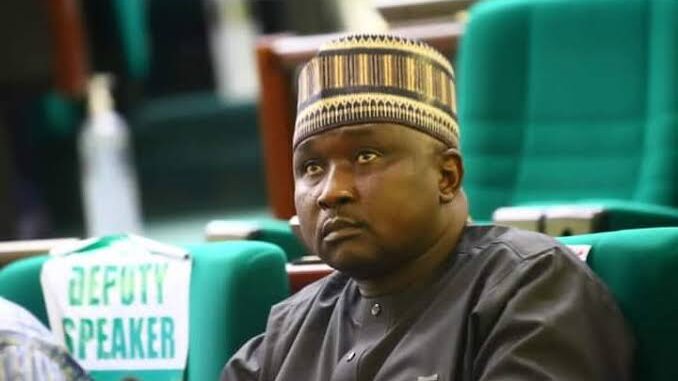
By Danladi Usman
The Majority Leader in the House of Representatives, Alhassan Doguwa, has said that he needed a sum of N70 million in “hard copy,” to cover his expenses for the general elections, which he premised on a statutory provision, citing a section of the constitution to justify his somewhat bogus claims.
However, findings have shown that Doguwa, who is a federal lawmaker, appeared to have ignorantly quoted the section of the law he made a disguised reference to without factoring in the fact that such a decision would countermand the Money Laundering (Prohibition) Act, 2022 (as amended).
Recalled following President Muhammadu Buhari’s state address on February 16, 2023, that the old N500 and N1000 notes were no longer legal tender and that his administration would only re-issue the old N200 notes, initially outlawed, until April 10, there has been widespread criticism among some governors and lawmakers in the ruling All Progressives Congress (APC) against the President’s directive.
Among the lawmakers who reacted to the President’s directive was the Majority Leader of the House of Representatives, a member of the ruling APC, Alhassan Doguwa, who spoke on Thursday, after a meeting with President Buhari at the Aso Rock villa in Abuja.
Reacting to the issue, the lawmaker noted that the President’s directive would put those seeking to win seats in the National assembly at a great disadvantage, lamenting that the N20,000 withdrawal limit of the CBN cashless policy would affect the election finances of his colleagues.
He said: “A member of the House of Representatives is expected by law to have [no] more than N70 million naira to conduct his elections, logistics, and other things. The law has permitted me to have N70 million as logistics. I need to have this N70 million in hard copy.
The speaker was referring to the spending cap for those running for seats in the lower legislative chamber as provided by section 88(4) of the electoral act, which states: “The maximum amount of election expenses to be incurred by a candidate in respect of Senatorial and House of Representatives seat shall not exceed N100,000,000 and N70,000,000, respectively.”
ALSO READ: US issues visa ban, blocks entry to Nigerians ‘undermining democracy’
Although the section of the law quoted by the lawmaker does not specify if the said money should be in cash or not but latest findings have revealed that there is no way the law will permit any candidate vying for a spot in the National Assembly to have access to such amount in cash, knowing it will be a strict violation of the Money Laundering Act of the Federal government.
The Act prohibits individual and corporate bodies, except in a transaction through a financial institution, from making or accepting cash payment exceeding the sum of N5,000,000.00 or its equivalent in case of an individual and N10, 000,000.00 or its equivalent, in case of corporate bodies.
Further to this, as provided for, details presented below further attests to the fact that, there is no way an individual would not be violating the Money Laundering Act, cashing out a whooping N70 million.
NOTABLE PROVISIONS IN THE ACT ON PROHIBITION OF MONEY LAUNDERING
2.1 Limitation on Cash Payment
The Act prohibits individual and corporate bodies, except in a transaction through a financial institution, from making or accepting cash payment exceeding the sum of N5,000,000.00 or its equivalent and N10, 000,000.00 or its equivalent, respectively.4
Furthermore, the Act prohibits the conduct of two or more transactions separately with one or more financial institutions or designated non-financial Business and Professions (“the Relevant Institutions”) with the intent to avoid the duty to report a transaction which should have been reported under the Act or breach the duty to disclose information under the Act by any other means.5
2.2 Duty to Report International Transfer or Transportation of Funds, Securities and Cash
The Act makes it mandatory for both individuals and corporate bodies (including a money service business) to send a report in writing to the Unit, the Central Bank of Nigeria (“CBN”) and the Securities and Exchange Commission (“SEC”) where any transfer of funds or securities to and from a foreign country, exceeds the sum of US$10, 000 or its equivalent, within a day from the date of the transaction.6 This report shall indicate the nature and amount of the transfer, the names and addresses of the sender and the receiver of the funds or securities.7
Flowing from the above, the Act also makes it mandatory on all individuals engaged in the transportation of cash or negotiable instruments exceeding the sum of US$10, 000 or its equivalent to declare such fact to the Nigerian Customs Service. The Nigerian Customs Service shall report such declaration to the CBN and the Unit.8
Any individual who falsely declares or fails to make a declaration in compliance with the provision of the Act as stipulated above commits an offence and is liable upon conviction to forfeit the undeclared funds or negotiable instrument or to imprisonment for a term of at least two years or both.9
It, therefore becomes a criminal offence to violate the provisions of the Act.
Verdict
In essence, as established, the claims made by the House majority leader, Alhassan Doguwa, citing a section of the law to allow him access to N70 million in hard copy for election spending have proven to be false and misleading.

